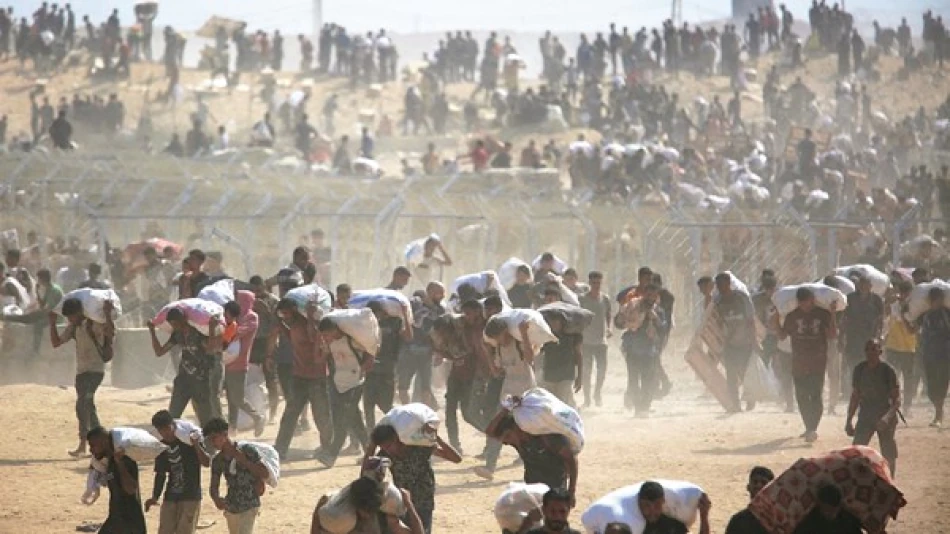
Gaza Pleads for UN Aid Activation to Avert Famine
Gaza Famine Crisis Reaches Critical Point as UN Experts Demand Immediate Action
A humanitarian catastrophe is unfolding in Gaza as over 500,000 people—a quarter of the population—face imminent famine, prompting UN human rights experts to issue urgent calls for Israel to restore the UN humanitarian aid system. With nearly 200 deaths already attributed to starvation and malnutrition, the crisis represents one of the most severe humanitarian emergencies in the region's recent history.
Starvation as a Weapon of War
UN human rights experts, including Special Rapporteur Francesca Albanese and Michael Fakhri, the Special Rapporteur on the Right to Food, have condemned what they describe as the deliberate use of starvation as a weapon of war—a practice that constitutes a war crime under international law. The experts are demanding immediate and unrestricted access for neutral humanitarian organizations, including UNRWA and the UN Office for the Coordination of Humanitarian Affairs (OCHA).
The current situation mirrors historical sieges where civilian populations were deliberately cut off from essential supplies, a tactic that international humanitarian law explicitly prohibits. The Geneva Conventions and their Additional Protocols clearly establish that starving civilians as a method of warfare is forbidden, making the current crisis not just a humanitarian disaster but a potential legal violation.
Children Bear the Heaviest Burden
The impact on Gaza's youngest residents is particularly devastating. All 320,000 children under five years old are at risk of acute malnutrition, with consequences that will affect their physical and psychological development for life. WHO Director-General Tedros Adhanom Ghebreyesus reported that July saw the highest monthly rate of acute malnutrition among children ever recorded in Gaza, with nearly 12,000 children under five diagnosed with severe malnutrition in that month alone.
These numbers represent more than statistics—they indicate a generation of children whose cognitive and physical development will be permanently impaired. Research from previous humanitarian crises, including those in Yemen and South Sudan, shows that children who experience severe malnutrition in early years face lifelong challenges including stunted growth, reduced cognitive capacity, and increased susceptibility to disease.
Failed Privatization Experiment Worsens Crisis
UN experts have criticized Israel's attempt to privatize aid delivery through the Gaza Humanitarian Foundation, calling it a "failed experiment" that has contributed to severe food shortages and resulted in approximately 1,400 deaths among people searching for food. This approach represents a departure from established humanitarian principles that emphasize neutral, impartial aid delivery through experienced international organizations.
The privatization of humanitarian aid is unprecedented in modern conflict zones. Traditional humanitarian response relies on established organizations like the World Food Programme, UNICEF, and UNRWA, which have decades of experience in complex emergencies. The attempt to bypass these systems appears to have created dangerous gaps in aid delivery at a critical time.
Mounting Death Toll Signals Systemic Failure
The Palestinian Ministry of Health reported four new famine-related deaths in the past 24 hours, bringing the total number of starvation deaths to 197, including 96 children. At least 99 people died from malnutrition between the beginning of the year and July 29, according to WHO data.
Rick Peeperkorn, WHO representative for the occupied Palestinian territories, emphasized that current food supplies remain "totally insufficient" to prevent further deterioration. The lack of dietary diversity compounds the crisis, as even when some food is available, it often lacks the nutrients necessary to prevent malnutrition, particularly in vulnerable populations like pregnant women and young children.
International Response and Legal Implications
The UN experts' call for international action reflects growing concern that the crisis may constitute violations of international humanitarian law. The deliberate restriction of humanitarian aid and the use of starvation as a weapon of war are serious allegations that could have legal ramifications under the Rome Statute of the International Criminal Court.
The situation in Gaza is being closely watched by humanitarian organizations worldwide, as it could set dangerous precedents for how aid is delivered in conflict zones. The international community's response—or lack thereof—may influence how future humanitarian crises are managed and whether established principles of neutral, impartial aid delivery are maintained.
With winter approaching and the humanitarian situation continuing to deteriorate, the window for preventing a full-scale famine is rapidly closing. The restoration of proper humanitarian access and the immediate scaling up of aid delivery are not just moral imperatives but legal obligations under international law.
Most Viewed News

 Layla Al Mansoori
Layla Al Mansoori






